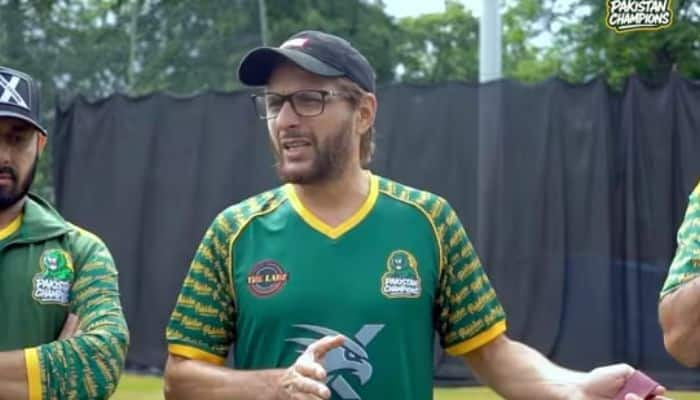In a tournament meant to unite cricket’s greatest, the World Championship of Legends (WCL) 2025 witnessed its most divisive moment. The much-hyped India vs Pakistan clash was cancelled, not because of weather or scheduling, but due to politics, provocation, and patriotism. At the heart of the storm? Shahid Afridi.
Following the Pahalgam terror attack on April 22, which claimed 26 lives, India launched Operation Sindoor, a swift and decisive military response. In the aftermath, while tensions between the two nations were already high, it was Afridi’s controversial and inflammatory remarks that seemed to pour salt into national wounds.
Shahid Afridi’s Outburst: “Nalayeq Ho, Nikamme Ho”
Afridi, never one to mince words, launched a scathing attack on the Indian Army during a Pakistani TV appearance. Mocking their capabilities, he questioned how such a tragedy occurred under the watch of “8 lakh soldiers,” calling them “inefficient and useless.”
The statement instantly went viral, triggering outrage among Indian fans, veterans, and—most notably—the legends slated to represent India at the WCL. His provocative rhetoric didn’t stop there. Afridi was later seen leading a celebratory rally in Pakistan after the ceasefire, further enraging Indian sentiment.
India’s Response: Pride Over Play
Shikhar Dhawan was the first to take a stand. In a heartfelt message, the India Champions opener announced his withdrawal from the match, citing national emotion and the need to honor those lost in Pahalgam. Soon, Yuvraj Singh, Suresh Raina, Harbhajan Singh, Yusuf Pathan, and Irfan Pathan followed suit.
According to sources close to the team, the players had no intention of making it personal with Afridi—but his comments became symbolic of everything they found unacceptable. The issue wasn’t about facing Afridi, but about representing a united front against perceived insensitivity.
With so many high-profile players opting out, organizers were left with no choice but to cancel the marquee fixture, awarding two points to Pakistan.
Afridi Hits Back: “Be Ambassadors, Not Embarrassments”
Never one to stay silent, Shahid Afridi launched a counterattack. He accused the Indian players of mixing politics with sports and called the boycott an “embarrassment for their country.”
“If they didn’t want to play, they should have said so before arriving. They came, practiced, and then walked away. This isn’t how professionals behave,” he stated.
Afridi insisted cricket should rise above politics, claiming he would’ve withdrawn if informed in advance. “What is Shahid Afridi in front of cricket? Nothing,” he humbly added—though not without aiming another veiled jab at an unnamed Indian player he dubbed a “bad egg.”
The Bigger Picture: More Than Just One Man
While Afridi’s name dominated headlines, Indian players clarified—privately and publicly—that the boycott wasn’t just about him. The match represented more than a rivalry; it was a moral choice made in the wake of national tragedy.
This was not simply a refusal to shake hands with a controversial rival. It was a collective stand against a country perceived to be complicit—or at the very least indifferent—toward terror originating from its soil.
What Now for WCL 2025?
Despite the drama, the WCL continues. Pakistan were awarded the points, and tournament co-owner Kamil Khan confirmed that efforts would be made to avoid India-Pakistan clashes in later rounds—unless both teams reach the final.
But this incident has cast a long shadow. The next Indo-Pak encounter, if it happens, may not just be a cricket match—it’ll be a litmus test of public sentiment, diplomacy, and personal conviction.

